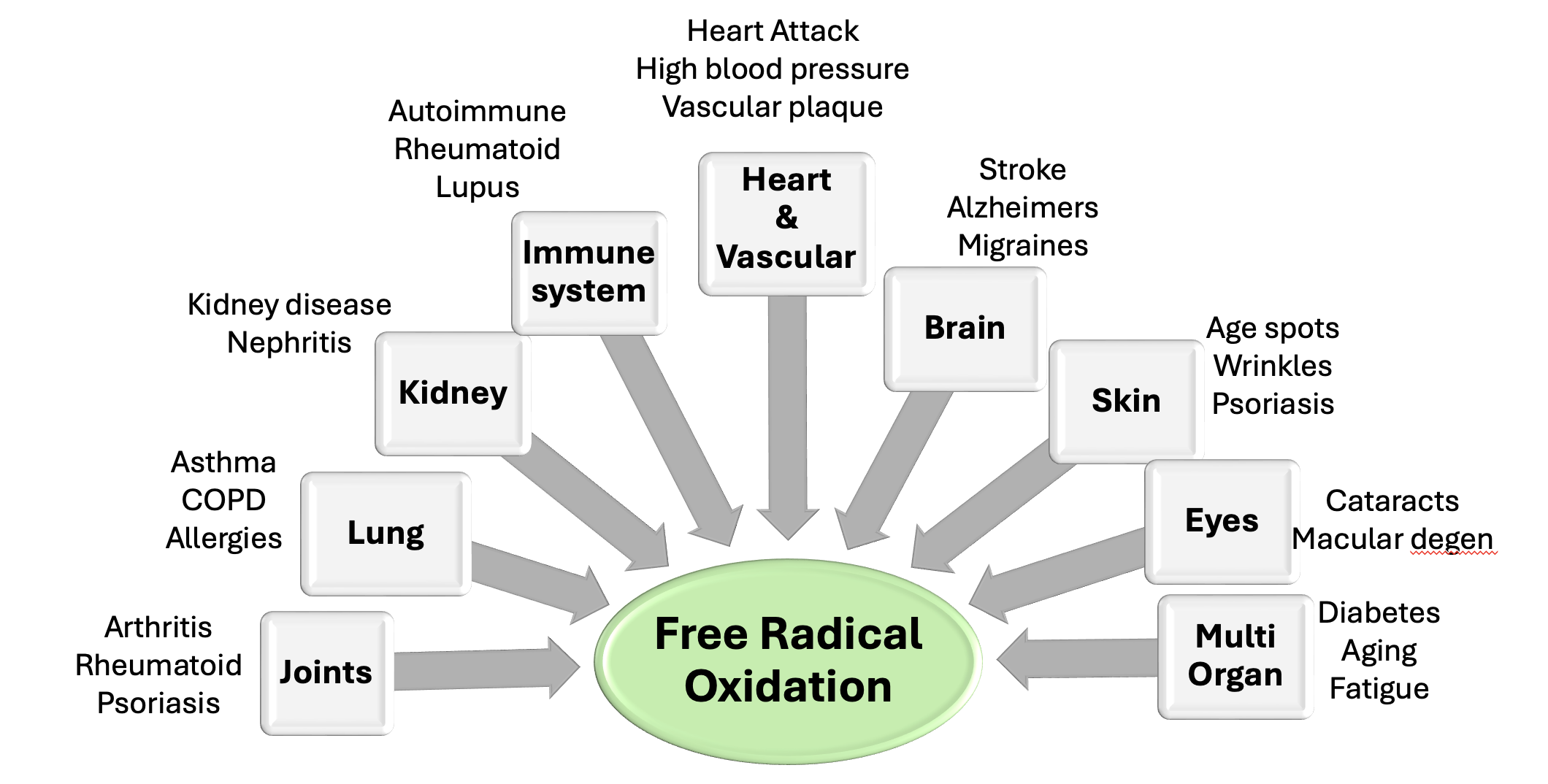Hydrogen Therapy Resolves Inflammation
Posted in Brain (Neurology), Cancer, Diabetes, Education, Heart & Vascular on Sep 05, 2024
Hydrogen education
Hydrogen – what is it? Go back to your junior high science class where you first saw the periodic table of elements. The colored chart that showed all the atoms that make up life. Things like carbon, oxygen, zinc, magnesium, helium, gold and yes, our hero, hydrogen. Hydrogen is the smallest element on the chart. It has the smallest molecular weight of anything we know of. When you take 2 hydrogen atoms and join them to one oxygen atoms you get H2O which is water. Hydrogen may be small and light, but it occurs in great abundance in your body tissues. If you added up all the hydrogen atoms in your body, it makes up 10% of your body weight. Even the bacteria in your intestines make up to 12 liters of hydrogen gas per day as they process your food. Yet with all of this precious hydrogen around us it is so light that it escapes the air we breathe and rises into the higher atmospheres, out of reach. What if we could harness hydrogen and breathe it in or even drink it? Well, that is what this article is all about. The magic of hydrogen.
But before we can appreciate how great a solution hydrogen is we need to appreciate the nature of the problem. Aging. What is aging on a molecular level? What drives the decay of our body over time? The answer is “oxidation” or oxidative stressors that alter our tissue. Some degree of oxidation in our body is normal and healthy as this is how we produce energy in the mitochondria of our cells. It’s similar to a car that burns gas but produces exhaust. We don’t want the exhaust but if we design an efficient system then the amount of exhaust is small and even tolerable. But a car that is old and burning oil and inefficient will put out a ton of black smoke and that's not healthy. Or think of sun exposure. Some sun is good for us even though it creates oxidation at the level of the skin. But excessive sun exposure can burn the skin due to excess oxidation causing damage.
We get exposed to different types of oxidative stressors such as:
• Radiation from the earth or from an x-ray
• EMF – electromagnetic fields from our cell phone and computers
• Pesticides and insecticides from non-organic food
• Sun exposure
• Processed foods in the diet
• Smoking or breathing in pollution
• Physical and psychological stress
• Alcohol & Prescription drugs
• Excessive exercise such as running a marathon.
Oxidation leads to:
• Brown spots – skin
• Wrinkles
• Vascular damage and plaque
• Stroke risk
• Alzheimers
• Cancer
• Headache / migraines
• Joint pain
• Inflammation
• Cataracts
• Diabetes
• Chronic fatigue
• Autoimmune disease
• Weight gain

Our body has 3 primary anti-oxidant systems (glutathione, catalase, SOD) to deal with normal amounts of daily oxidation but it can become overwhelmed when oxidation is high. These systems are meant to manage the common oxidative stress compounds but there is one oxidative stress element known as “hydroxyl” groups (an oxygen bound to one hydrogen, -OH) that is the MOST destructive. Experts estimate that it causes 60-70% of the damage to tissues and is not easily cleaned up by our standard anti-oxidation systems.
This is where hydrogen is the superhero we desire. Hydrogen is a powerful antioxidant that specifically targets hydroxyl (-OH) groups. And because of its small size it can penetrate any and all tissues, even right into the nucleus to protect our DNA from damage. Despite its power, hydrogen doesn't interfere with the normal oxidation that occurs in our mitochondria, so it doesn't interfere with our ability to generate energy. In fact, hydrogen is so safe that in hundreds of studies done, no side effects have ever been seen.
How long does hydrogen stay in my body when consumed? Estimates range from 1-2 hours depending on dose received but the impact of hydrogen can last for many more hours or even days. Hydrogen stimulates systems within the cell to work long after it has left the body. It turns on helpful genes that then go to work to protect the body. This is key to hydrogens awesome impact on our health. Its small size allows it to go deep into all tissues where other antioxidants can’t reach. Its specificity to grab hydroxyl groups (-OH) the worst oxidant is very unique. Lastly its ability to turn on our defense systems and stimulate gene activation for protection.
If I have whetted your appetite to learn more about hydrogen then plan to view my podcast on hydrogen which will be released in the next 2 weeks. I will also be posting some of the amazing research showing the impact of hydrogen on a wide variety of health issues on my “Instagram – Huber Personalized Medicine”.
If you would like to try hydrogen therapy for yourself then simply contact our office at Phone: 513-924-5300 and schedule a time. Or stop by with a quart of water and we will hydrogenate this for you for easy consumption.